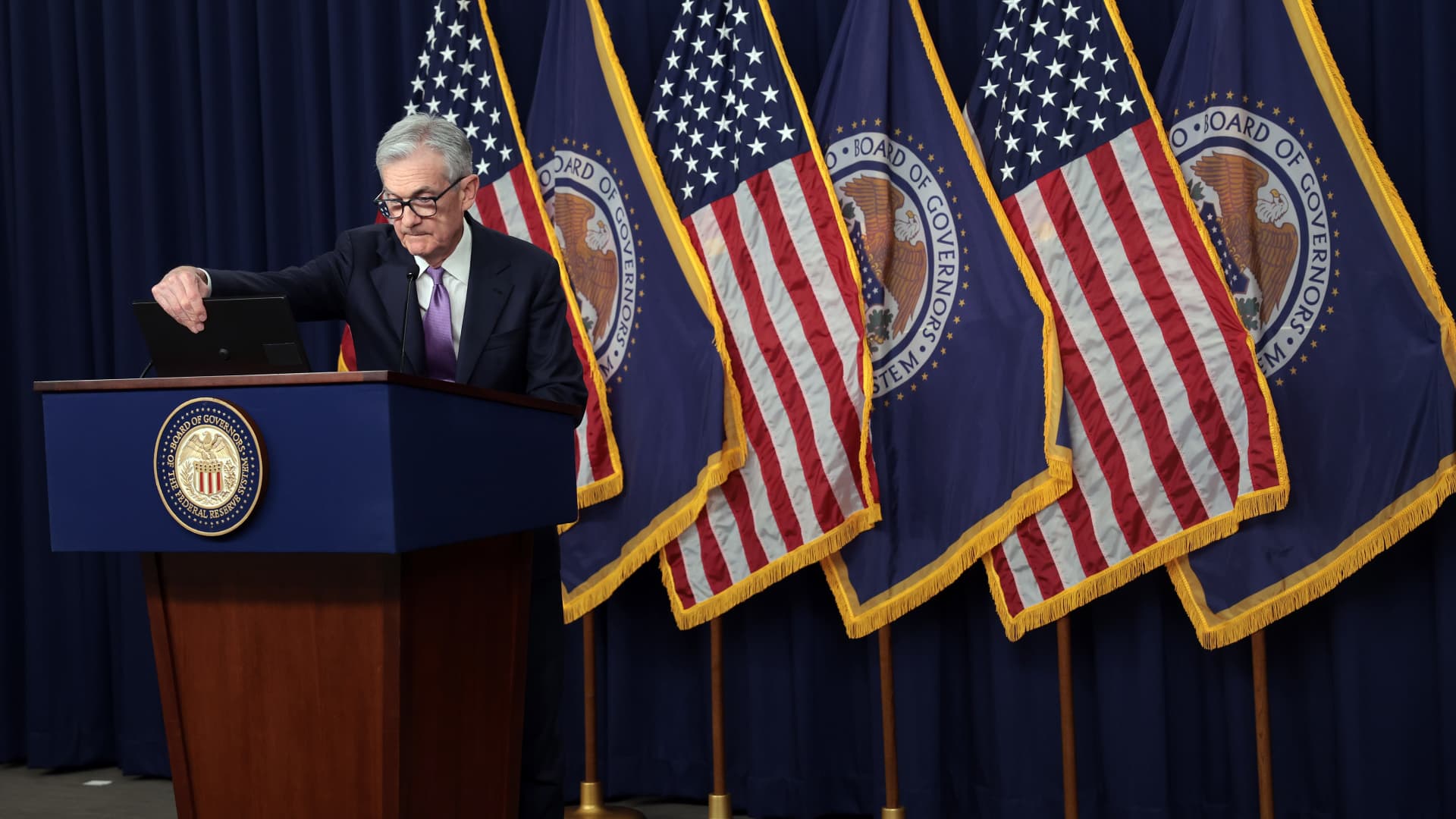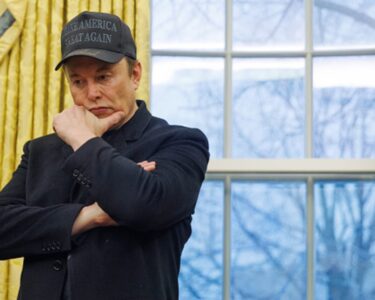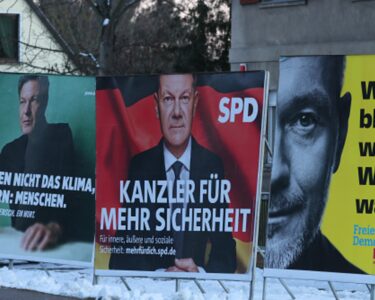This is CNBC’s live blog tracking developments on the war in Ukraine. See below for the latest updates.
European markets bounced on Thursday as investors reacted positively to the U.S. Federal Reserve’s signal that interest rate cuts will take place next year.
The pan-European Stoxx 600 index closed up by 0.9%, having earlier hit its highest point since Jan. 2022.
Mining stocks jumped 3% to lead gains, as almost all sectors and major bourses finished in positive territory. Insurance stocks bucked the positive trend to fall 1.8%.
On Wednesday, the Federal Open Market Committee kept interest rates unchanged in a range between 5.25% and 5.5%, in line with Wall Street’s expectations. Market sentiment was buoyed after policymakers penciled in at least three rate cuts next year.
On Wall Street, the Dow rose to a fresh record as investors also cheered more strong economic data, while Hong Kong stocks led a rally among Asia-Pacific equity markets overnight.
Investors in Europe turned their focus to monetary policy decisions from the European Central Bank and Bank of England on Thursday, both of which opted to keep interest rates unchanged.
The European Central Bank on Thursday held interest rates steady for the second meeting in a row, as it revised its growth forecasts lower.
The bank was widely expected to leave policy unchanged in light of the sharp fall in euro zone inflation, as investors instead chase signals on when the first rate cut may come and assess the ECB’s plans to shrink its balance sheet.
“The Governing Council’s future decisions will ensure that its policy rates will be set at sufficiently restrictive levels for as long as necessary,” it said in a statement.
Read the full story here.
– Jenni Reid
Shares of AMS-Osram jumped more than 13% by mid-afternoon to lead the Stoxx 600 after Jefferies upgraded the Austrian electronics company’s stock to “buy” from “hold.”
Swedish investment firm EQT also posted gains of around 13%.
At the bottom of the European blue chip index, Italian banks tumbled across the board after the Federal Reserve’s rate cut hint prompted investors to take profits on the sector, which has benefited significantly from a period of higher interest rates.
BPER Banca was down 6.1%, Banco De Sabadell fell 5.1%, Banco BPM dropped 4.6% and Unicredit shed 3.9%.
– Elliot Smith
The Bank of England on Thursday kept its main interest rate unchanged at 5.25% and said monetary policy is “likely to need to be restrictive for an extended period of time.”
The Monetary Policy Committee voted 6-3 in favor of holding rates steady for a third consecutive meeting. The three dissenting members favored a further 25 basis point hike to 5.5%.
“As illustrated by the November Monetary Policy Report projections, the Committee continues to judge that monetary policy is likely to need to be restrictive for an extended period of time,” the MPC said.
“Further tightening in monetary policy would be required if there were evidence of more persistent inflationary pressures.”
Read the full story here.
– Elliot Smith
Inflation in Russia could near 8% by the end of the year, Russian President Vladimir Putin said Thursday, during his first press conference since the full-scale invasion of Ukraine.
“Unfortunately, our inflation has increased, that’s true. By the end of the year, 7.5% is expected, maybe a little more, towards 8%,” Putin said, according to a Google translation of comments reported by Russian state news agency Tass.
“But the Central Bank and the government are taking the necessary measures. We can talk about this more, I mean raising the key rate and some other measures that the Central Bank and the government are taking. And we proceed from the fact that we will be able to return to the target indicators,” Putin added, according to the report.
Russian inflation was 7.5% year-on-year in November, up from 6.7% in October, national statistics showed, according to LSEG data.
The central bank has rapidly hiked rates this year to dampen price rises and also tackle weakness in the ruble.
— Jenni Reid
The Norwegian central bank on Thursday said that it had hiked its interest rates by 25 basis points, putting the main policy rate at 4.5%.
Norges Bank Governor Ida Wolden Bache said in a statement that inflation remained too high despite the economy easing and noted that the central bank expects to maintain the current policy rate “for some time ahead.”
The majority of economists previously polled by Reuters had expected the central bank to leave rates unchanged.
— Sophie Kiderlin
Germany’s DAX crossed the 17,000 point mark for the first time on Thursday, peaking at 17,003.28 points. It has since eased slightly and was last hovering near 16,975 points.
The index is currently up by more than 21% year to date.
The rise comes despite the struggles of the German economy in recent months. The country entered a technical recession in the first quarter of 2023 and is widely expected to contract this year.
— Sophie Kiderlin
The Swiss National Bank on Thursday held interest rates steady at 1.75%, in line with analysts’ expectations.
The Swiss central bank, which has lifted rates from negative 0.75% in a series of hikes over the last 18 months, also held its interest rate on sight deposits at 1.75%.
— Karen Gilchrist
The pan-European Stoxx 600 index was up 1.7% in early trade to hit its highest point since Jan. 2022, while Germany’s DAX crossed the 17,000-point mark for the first time ever.
Shares of AMS-Osram jumped more than 10% in early trade to lead the Stoxx 600 after Jefferies upgraded the Austrian electronics company’s stock to “buy” from “hold.”
Vivendi shares climbed 9% after the French media giant announced that it is considering breaking up into several listed entities.
Swedish investment firm EQT also posted double-digit gains.
– Elliot Smith
European stocks surged at Thursday’s open after the Federal Reserve’s dovish signal.
The pan-European Stoxx 600 index was up 1.6% in early trade, with mining stocks jumping 3.8% to lead gains as all sectors and major bourses traded in positive territory.
Citi highlighted opportunities in three stocks after Argentina devalued its currency by 50%
The drastic devaluation was part of a new economic plan announced by libertarian President Javier Milei, who took office earlier this week. One U.S. dollar will now fetch 800 Argentine pesos, up from 400 pesos earlier.
The U.S.-listed shares of two Argentine companies have also run up by more than 40% since Milei’s election, on hopes of an economic turnaround.
CNBC Pro subscribers can read more here.
— Ganesh Rao
The boom in weight loss drugs has made pharmaceutical giant Novo Nordisk favorable to many investors this year – but one investment bank has reservations on the stock.
“Over the coming year, we envisage sentiment to change, perhaps initially as a result of the launch of competitor Eli Lilly‘s anti-obesity drug Zepbound and the risk of disappointment from slower than anticipated Wegovy supply ramp-up,” Jefferies’ analysts led by Peter Welford wrote in a Dec. 7 equity research note.
But not everyone agrees, with other analysts being bullish on the stock.
subscribers
— Amala Balakrishner
European markets are set to open in negative territory Monday.
The U.K.’s FTSE 100 index is expected to open 15 points lower at 7,671, Germany’s DAX down 15 points at 16,573, France’s CAC down 14 points at 7,405 and Italy’s FTSE MIB down 62 points at 30,468, according to data from IG.
Euro zone retail sales data for December will be released Monday.
— Holly Ellyatt






